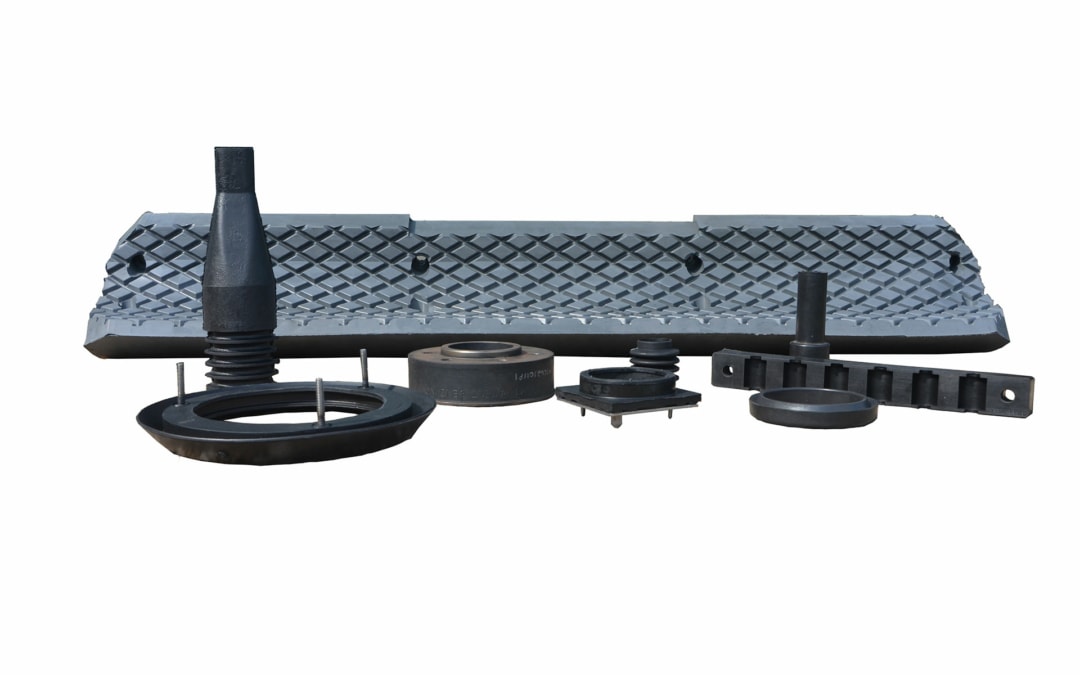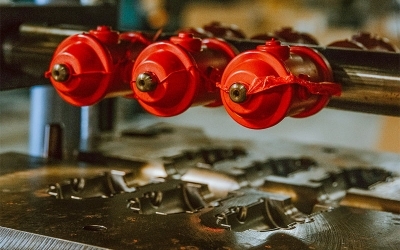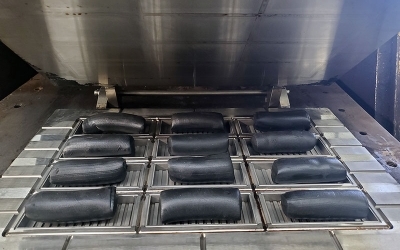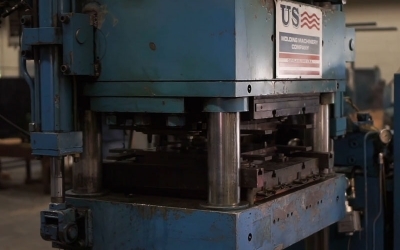Synthetic Rubber Manufacturer in Erie, PA
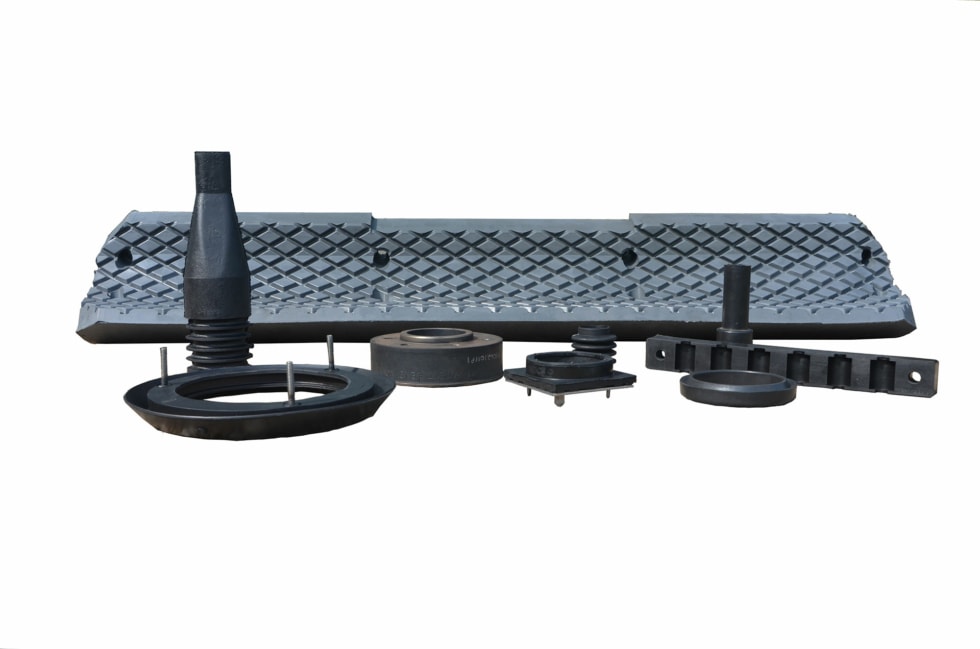
Synthetic Rubber Manufacturer in Erie, PA
Lake Erie Rubber is a rubber manufacturer based in Erie, Pennsylvania that specializes in injection molding, transfer molding, and compression molding. We design and manufacture specific rubber parts for a variety of industries and applications, including rail, construction, oil and gas, and automotive. We work together with our clients to learn more about their material specifications and ensure that we use the best rubber elastomer for your application. Learn more about the characteristics of synthetic rubber, as well as the many different types. Get in touch with us to learn more about our synthetic rubber manufacturing capabilities.
Synthetic Rubber vs Natural Rubber
There are many different types of rubber. In general, they can be divided into two overarching categories: natural rubber and synthetic rubber. Natural rubber has been used in manufacturing since the 1800s, and comes from the hevea tree, also known as the Pará rubber tree or simply the rubber tree. Over time, as demand for rubber grew, and as applications became more complex and specific, synthetic rubbers were developed. Now, there are many synthetic rubber polymers that have been developed with specific properties and characteristics in mind for use with specific applications.
Advantages of Synthetic Rubber
As there are many different types of synthetic rubber, the advantages will vary depending on which you choose. Advantages of synthetic rubber include durability, longevity, ozone and weather resistance, and the ability to withstand wide ranges of temperatures. Some synthetic rubbers are also much cheaper to produce when compared to natural rubber. Learn more about the advantages of the specific synthetic rubbers that we use in our manufacturing below.
EPDM
EPDM, or ethylene-propylene-diene monomer, is commonly used across many industries. It is durable, flexible, and resistant to water, UV, ozone, weathering, and many other chemicals. It can also withstand a wide range of temperatures, and will not degrade when exposed to cycling temperatures. Due to these characteristics, it is often used in roofing, as well as in the automotive, construction, and locomotive industries.
Silicone
Silicone is a durable, flexible, non-reactive, and extremely resistant synthetic rubber. It is weather resistant, able to withstand exposure to wind, rain, oxygen, UV, and ozone. It also has a low toxicity, making it extremely popular for medical and food applications. In the medical field, it is often used in pacemakers, stents, feeding tubes, and respiratory masks. When it comes to food applications, it is commonly found in kitchen utensils, storage containers, and cookware.
Neoprene
Neoprene, or polychloroprene, is a synthetic rubber with many different applications. It is known for its chemical resistance and great physical properties, providing resistance to ozone, sunlight, oxidation, weather, oils, gasoline, and much more. Its strong water resistance also makes it a popular choice for many aquatic applications, including wetsuits and equipment used for diving, fishing, surfing, and boating.
Nitrile
Nitrile butadiene rubber (NBR) is another commonly used synthetic rubber. It has unusually strong resistance to oil, gasoline, acids, aliphatic hydrocarbons, and other chemicals, as well as a wide temperature operating range. It is frequently used in the automotive and aerospace industries, and is probably best known for its use in disposable rubber gloves, often used for medical examinations.
HNBR (Saturated Nitrile)
HNBR, also known as hydrogenated nitrile butadiene rubber, or saturated nitrile, is a special type of NBR that has been hydrogenated to increase saturation. This saturation improves its resistance to heat and ozone. HNBR also has great mechanical properties and is abrasion resistant. It is commonly used in seals, hoses, and belts.
SBR
Styrene butadiene rubber (SBR) is a common synthetic material that is cost effective, abrasion resistant, and very durable. It is commonly used in the automotive, construction, and electrical industries, and is known for its prevalence in footwear. Due to its abrasion resistance, it is a great material for manufacturing shoe soles.
Viton
Viton, also known as Fluorocarbon or simply FKM, is a synthetic material that has excellent heat resistance, as well as resistance to fuels and chemicals. As such, it is commonly found in applications where it is frequently in contact with biofuels or other extreme chemical environments.
Fluorosilicone (FSI)
Fluorosilicone, or FSI, is another synthetic material that has excellent resistance to chemicals, fuel, and oil. As a result of these properties, it is commonly used in seals and gaskets in fuel applications.
Butyl Rubber (Isobutene-Isoprene)
Butyl rubber, or isobutene-isoprene, has excellent flex properties and exceptional resistance to gas and moisture. It is also resistant to sunlight, ozone, heat aging, and oxidizing chemicals, and has excellent abrasion resistance. It is commonly used in medical, aerospace, and military applications.
Urethane
Urethane is a synthetic material that has exceptional heat resistance, and does not melt when heated. It is commonly found in various wheels and tires, automotive suspension bushings, hoses, and more.
Polyisoprene
Polyisoprene is another synthetic rubber polymer that is commonly used in many industries. It has great tensile strength and is resistant to abrasion, chemicals, weather, and low temperatures. This makes it a great choice for a variety of medical devices and equipment.
Lake Erie Rubber’s Synthetic Rubber Manufacturing
Lake Erie Rubber is an experienced rubber manufacturer with capabilities to manufacture a wide range of synthetic and natural rubber products. Get in touch with us today to learn more about how we can help fulfill your specific requirements and manufacture top notch rubber products.

